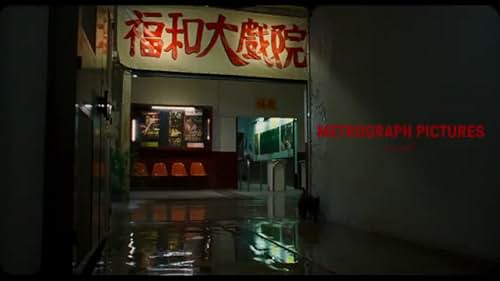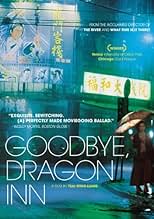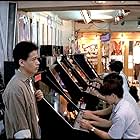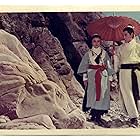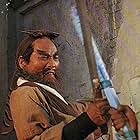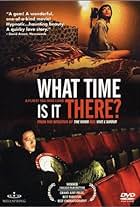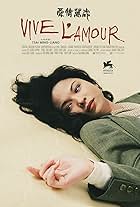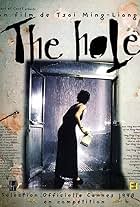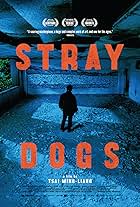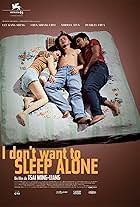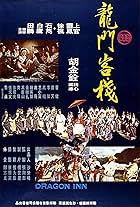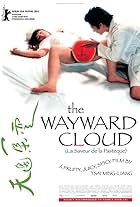IMDb RATING
7.1/10
6.5K
YOUR RATING
On a dark, wet night a historic and regal Chinese cinema sees its final film. Together with a small handful of souls they bid "Goodbye, Dragon Inn".On a dark, wet night a historic and regal Chinese cinema sees its final film. Together with a small handful of souls they bid "Goodbye, Dragon Inn".On a dark, wet night a historic and regal Chinese cinema sees its final film. Together with a small handful of souls they bid "Goodbye, Dragon Inn".
- Awards
- 13 wins & 11 nominations
- Director
- Writers
- All cast & crew
- Production, box office & more at IMDbPro
Storyline
Did you know
- TriviaThe theater used for the film was actually on the brink of being closed, and shortly before the film was released it was indeed closed, in an strange example of life imitating art.
- ConnectionsFeatures Dragon Inn (1967)
- SoundtracksChong Feng
by Ge Lan
Featured review
"Good Bye, Dragon Inn (Bu san)" is something of a Taiwanese "Cinema Paradiso" and "Last Picture Show" in its love of old movie theaters and evoking the unfulfilled longings we project onto movies and their showcases.
We take refuge (and I have no idea how we were supposed to know that one of the characters we are following in is a Japanese tourist, per the IMDb plot description) during a rain storm on the last night at a huge theater, and the camera slowly leads us through every inch of the place.
The vast scale of the place is brought home to us (and it will have less impact when not seen on a big screen) as virtually every inch is navigated painfully by a lame employee, clumping (as we only hear ambient sounds) up and down all those stairs, from the red velveteen seats around every nook and cranny and down long hallways and seedy passageways.
I don't know if only a Western viewer thinks at first one character is a pedophile or another a transvestite, as the theater certainly looks like the old ones that were in Times Square, or if writer/director Ming-liang Tsai is toying with all of us, as he brings other assignation attempts closer (in what must be the longest time any men have ever spent leaning against a urinal), but they are as unreal as the movie-within-a-movie, the swordplay flick "Dragon Inn" which is just a bit more stilted and corny than the current "Warriors of Heaven and Earth (Tian di ying xiong)."
There is one especially lovely moment, within beautiful cinematography throughout, of reaction to the flickering screen when the employee pauses in her rounds to look up at the huge image of the warrior princess and shares our view of the screen with her. Amusingly, the only fulfilled feelings are hunger, as various characters noisily eat a wide variety of refreshments.
The projectionist is as much an unseen power as Herr Drosselmeier in "The Nutcracker," as we don't even see him until the theater is almost ready to close. He is as oblivious to interacting with real people as every other member of the sparse audience.
The major events in the film are when two characters even acknowledge each other's existence, let alone speak the only three lines or so of spoken dialogue in the entire film, reiterating what we've seen visually -- "No one goes to the movies anymore." The closing nostalgic pop song is jarringly intrusive at first to this quiet film, but the lyrics are very appropriate.
We take refuge (and I have no idea how we were supposed to know that one of the characters we are following in is a Japanese tourist, per the IMDb plot description) during a rain storm on the last night at a huge theater, and the camera slowly leads us through every inch of the place.
The vast scale of the place is brought home to us (and it will have less impact when not seen on a big screen) as virtually every inch is navigated painfully by a lame employee, clumping (as we only hear ambient sounds) up and down all those stairs, from the red velveteen seats around every nook and cranny and down long hallways and seedy passageways.
I don't know if only a Western viewer thinks at first one character is a pedophile or another a transvestite, as the theater certainly looks like the old ones that were in Times Square, or if writer/director Ming-liang Tsai is toying with all of us, as he brings other assignation attempts closer (in what must be the longest time any men have ever spent leaning against a urinal), but they are as unreal as the movie-within-a-movie, the swordplay flick "Dragon Inn" which is just a bit more stilted and corny than the current "Warriors of Heaven and Earth (Tian di ying xiong)."
There is one especially lovely moment, within beautiful cinematography throughout, of reaction to the flickering screen when the employee pauses in her rounds to look up at the huge image of the warrior princess and shares our view of the screen with her. Amusingly, the only fulfilled feelings are hunger, as various characters noisily eat a wide variety of refreshments.
The projectionist is as much an unseen power as Herr Drosselmeier in "The Nutcracker," as we don't even see him until the theater is almost ready to close. He is as oblivious to interacting with real people as every other member of the sparse audience.
The major events in the film are when two characters even acknowledge each other's existence, let alone speak the only three lines or so of spoken dialogue in the entire film, reiterating what we've seen visually -- "No one goes to the movies anymore." The closing nostalgic pop song is jarringly intrusive at first to this quiet film, but the lyrics are very appropriate.
- How long is Goodbye, Dragon Inn?Powered by Alexa
Details
- Release date
- Country of origin
- Languages
- Also known as
- Good Bye, Dragon Inn
- Filming locations
- Production company
- See more company credits at IMDbPro
Box office
- Gross US & Canada
- $35,120
- Opening weekend US & Canada
- $5,322
- Sep 19, 2004
- Gross worldwide
- $1,029,643
- Runtime1 hour 22 minutes
- Color
- Sound mix
- Aspect ratio
- 1.85 : 1
Contribute to this page
Suggest an edit or add missing content


